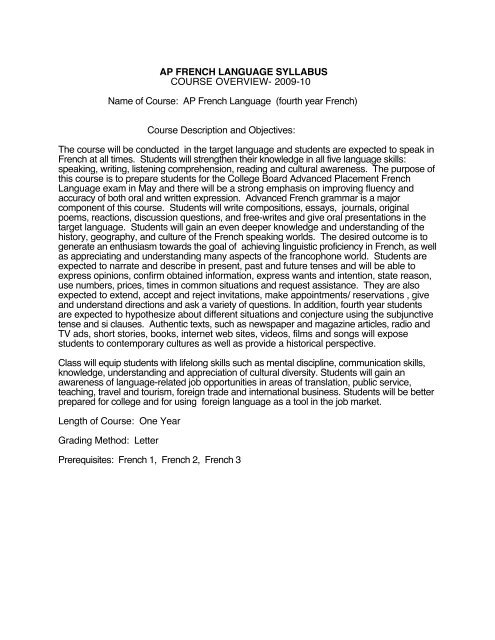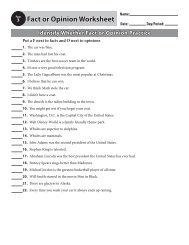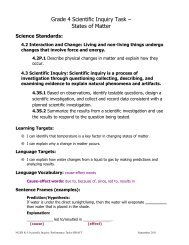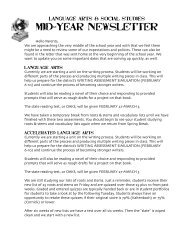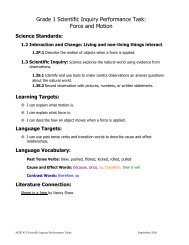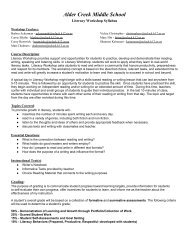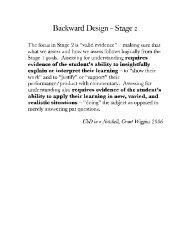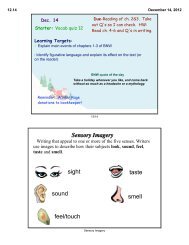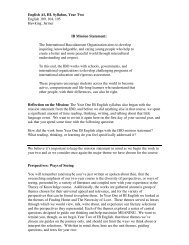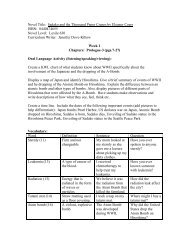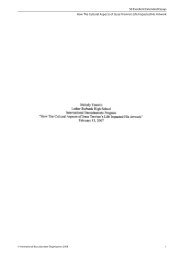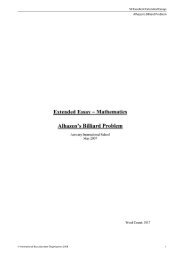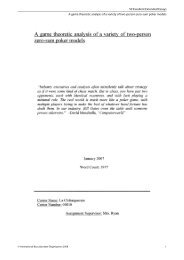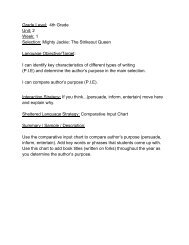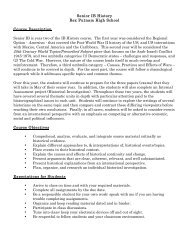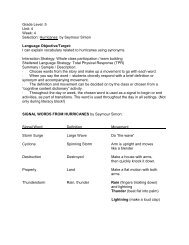AP French
AP French
AP French
You also want an ePaper? Increase the reach of your titles
YUMPU automatically turns print PDFs into web optimized ePapers that Google loves.
<strong>AP</strong> FRENCH LANGUAGE SYLLABUS<br />
COURSE OVERVIEW- 2009-10<br />
Name of Course: <strong>AP</strong> <strong>French</strong> Language (fourth year <strong>French</strong>)<br />
Course Description and Objectives:<br />
The course will be conducted in the target language and students are expected to speak in<br />
<strong>French</strong> at all times. Students will strengthen their knowledge in all five language skills:<br />
speaking, writing, listening comprehension, reading and cultural awareness. The purpose of<br />
this course is to prepare students for the College Board Advanced Placement <strong>French</strong><br />
Language exam in May and there will be a strong emphasis on improving fluency and<br />
accuracy of both oral and written expression. Advanced <strong>French</strong> grammar is a major<br />
component of this course. Students will write compositions, essays, journals, original<br />
poems, reactions, discussion questions, and free-writes and give oral presentations in the<br />
target language. Students will gain an even deeper knowledge and understanding of the<br />
history, geography, and culture of the <strong>French</strong> speaking worlds. The desired outcome is to<br />
generate an enthusiasm towards the goal of achieving linguistic proficiency in <strong>French</strong>, as well<br />
as appreciating and understanding many aspects of the francophone world. Students are<br />
expected to narrate and describe in present, past and future tenses and will be able to<br />
express opinions, confirm obtained information, express wants and intention, state reason,<br />
use numbers, prices, times in common situations and request assistance. They are also<br />
expected to extend, accept and reject invitations, make appointments/ reservations , give<br />
and understand directions and ask a variety of questions. In addition, fourth year students<br />
are expected to hypothesize about different situations and conjecture using the subjunctive<br />
tense and si clauses. Authentic texts, such as newspaper and magazine articles, radio and<br />
TV ads, short stories, books, internet web sites, videos, films and songs will expose<br />
students to contemporary cultures as well as provide a historical perspective.<br />
Class will equip students with lifelong skills such as mental discipline, communication skills,<br />
knowledge, understanding and appreciation of cultural diversity. Students will gain an<br />
awareness of language-related job opportunities in areas of translation, public service,<br />
teaching, travel and tourism, foreign trade and international business. Students will be better<br />
prepared for college and for using foreign language as a tool in the job market.<br />
Length of Course: One Year<br />
Grading Method: Letter<br />
Prerequisites: <strong>French</strong> 1, <strong>French</strong> 2, <strong>French</strong> 3
<strong>AP</strong> FRENCH LANGUAGE COURSE PLANNER<br />
There is no one text for <strong>AP</strong> <strong>French</strong> , but materials will be pulled from a variety of sources,<br />
including the web. Themes, culture, grammar studies and vocabulary will be taken primarily<br />
from the following texts:<br />
Discovering <strong>French</strong> Rouge-2007 (with all components)<br />
Jean-Paul Valette / Rebecca M. Valette<br />
McDougal Littell<br />
Trésors du Temps - 2005 (with all components)<br />
Yvone Lenard<br />
Glencoe / McGraw-Hill<br />
<strong>French</strong> Three Years Workbook- Second Edition 2006<br />
Eli Blume - Gail Stein<br />
Amsco School Publications, Inc.<br />
Please refer to the bibliography for other sources. Evaluations will include quizzes and tests<br />
on grammar, vocabulary and comprehension, essays and other weekly writings, oral<br />
presentations and in-class oral evaluations and cultural projects. Once a week, students can<br />
expect to write a composition or original writing, in some format to be kept in a portfolio.<br />
This will include regularly writing a summary of or responding to a news article or current<br />
event from a <strong>French</strong> web site. In preparation for the <strong>AP</strong> exam in May, practice tests will be<br />
given starting at the second semester, along with released College Board <strong>AP</strong> <strong>French</strong><br />
Language tests (1998-2004).<br />
FIRST SEMESTER<br />
THEMES DF Rouge TRESORS FR.III YRS<br />
__________________________________________________________________<br />
*Connaître et se U. 3/ 8 Première étape Parts of ch 1-5<br />
connaître La France, ses -présent<br />
provinces et ses -p.c et impératif<br />
*Les introductions départements -imparfait<br />
*Les vacances<br />
*La nature et l’environnement<br />
*La ville et la campagne Ch. 7-8<br />
-le futur<br />
-le conditionnel<br />
Film study: La Gloire de mon Père #1
__________________________________________________________________<br />
*Le shopping U. 4 Quatrième étape Parts of ch. 18 &19<br />
*Demander une service La Farce de Maître Articles / Nouns<br />
Pathelin<br />
-Partitif<br />
*La Nourriture/ les boissons Révision-pronoms Ch. 28<br />
d’objets directs et -Exclamations<br />
indirects<br />
-Interrogatives<br />
Film study : La Gloire de mon Père #2<br />
Ch. 25<br />
-Comparisons<br />
__________________________________________________________________<br />
*La famille et les U. 1 / 9 Troisième étape Ch. 11<br />
rapports humains Tristan et Yseut -Reflexive verbs<br />
Ch. 24<br />
-Adj. and Adverbs<br />
Ch. 29<br />
-Possession<br />
Ch. 22<br />
-Relative pronouns<br />
Film study: La Gloire de mon Père - final<br />
__________________________________________________________________<br />
*Les voyages U. 5 / 6 Troisième étape Ch. 21<br />
La grammaire-<br />
-Object Pronouns<br />
*Les moyens de transport le passé -Double Object<br />
pronouns<br />
*La douane<br />
Cinquième étape<br />
La Renaissance-Pantagruel Ch. 29<br />
*L’Hôtel François Rabelais -Possessive Adj.<br />
Ch. 17<br />
Film study: Au Revoir Les Enfants #1 -Negation<br />
Interrog. pronouns<br />
__________________________________________________________________<br />
*Les médias U. 10 Sixième étape Ch. 13,14,15<br />
-la presse Le dix-septième siècle -le subjonctif<br />
-la télévision Le Grand Siècle ou (présent et passé)<br />
-la radio<br />
L‚Age Classique<br />
-la vie professionnelle L’Ecole des Femmes Ch. 10<br />
Molière<br />
-Present participle<br />
Film study: Au Revoir... #2
__________________________________________________________________<br />
*Les actualités U. 8 Huitième étape Ch. 9<br />
-la politique -La Révolution -Plus-que-parfait<br />
-l’immigration -le participe présent -Future Perfect<br />
-le racisme<br />
-Past Conditional<br />
-la guerre -Souvenirs - si clauses<br />
-divers Mme. Vigée Lebrun - hypotheticals<br />
-les opinions<br />
(Marie-Antoinette à Versailles)<br />
*Les arts<br />
-l’architecture<br />
-les perspectives<br />
-la ville et la campagne<br />
Film study : Au Revoir... - final<br />
__________________________________________________________________<br />
SECOND SEMESTER<br />
THEMES DF Rouge TRESORS FR. III YRS.<br />
*La carrière U. 10 / 6 Onzième étape Ch. 13,14,15<br />
-l’économie le 19ème siècle -Le subjonctif<br />
-le logement<br />
-les métiers<br />
Les Misérables<br />
-l’argent Victor Hugo Ch. 30<br />
-faire une concession<br />
-Demonstratives<br />
-le subjonctif avec les conjonctions<br />
*Les tribulations de la vie<br />
quotidienne<br />
-les pronoms relatifs<br />
Film study: L’Argent de Poche #1<br />
__________________________________________________________________<br />
*La maison / les vêtements<br />
-les ordinateurs Douzième étape<br />
-la cuisine Le vingtième siècle: Ch. 22 /review<br />
-les adverbes<br />
Age de grand progrès<br />
-les pronoms démonstratifs<br />
-le comparatif / superlatif Extraits de : grammar review<br />
*Les loisirs<br />
-les sports et le cinéma<br />
Camus, Prévert, Duras, Bâ<br />
-si clauses<br />
-voix passive<br />
Film study: L’Argent de Poche #2
__________________________________________________________________<br />
Vocabulary / Idiomatic expressions / Released <strong>AP</strong> exams 1998-2004- all parts will be<br />
practiced throughout the second semester, including tape recordings of picture sequences.<br />
Film study : L’Argent de Poche- final<br />
Lecture: Le Petit Prince- Antoine de Saint-Exupéry (after <strong>AP</strong> exam)<br />
Speaking:<br />
TEACHING STRATEGIES:<br />
Speaking, reading, writing , listening and comprehension activities are integrally incorporated<br />
into the lessons in DF Rouge and Trésors du Temps. There are many paired activities and<br />
role plays that accompany the lessons. Additionally, each day the class will start out with an<br />
oral communication task of some sort. It may be a “pratique orale” where students circulate<br />
around the room and ask each other or their partners questions (either prepared in general<br />
for them to formulate on a grid or written specifically to practice a grammar point we are<br />
learning). Sometimes it will be a group interview, where they have to ask specific<br />
information. We later debrief orally. Sometimes I will have them read a short biography of a<br />
famous <strong>French</strong> person (author, sports figure, historical figure, singer, etc) in partners and<br />
then they role play. One of them poses as a journalist, the other is the famous person. The<br />
journalist asks questions to evoke answers that were mentioned in the reading.<br />
Sometimes I have them play password with their vocabulary. They each have a list of<br />
words and they describe them or define them to each other in <strong>French</strong> until their partner<br />
guesses the word. These words can come right from the lesson vocabulary. list. This is a<br />
great practice for circumlocution. I have a huge supply of pictures that I have cut out of<br />
magazines and sometimes I give the students a picture and they describe it to their partner<br />
in detail, even making up a little story. This can be done in groups as well. I use the Deux à<br />
Deux paired activities for students to do in partners . I have other tête-à-tête activities<br />
where students need to get information from their partners by asking questions. Sometimes<br />
I give them mini-dialogues to act out with their partners and include a few comprehension<br />
questions as well. I also use situation cards that I give students randomly and they role play<br />
the situations in <strong>French</strong>. When we study the provinces of France I have students chose a<br />
province to explore in depth and provide them with a scoring guide for an oral presentation.<br />
They have to search more in depth for information on the province (web sites, books , etc.)<br />
and present the information orally to the class. They must include the location in France, the<br />
geography and natural beauty of the region, historic monuments, museums, fun things to<br />
do in the area, major tourist attractions, cultural events, main sports or festivals of the region,<br />
main cities, climate, best time to visit and why, famous people from the region, economy,<br />
regional dialects, foods of the province etc. They prepare the information outside of class<br />
and present orally . It’s a good way for others to learn about the area too! Occasionally I<br />
just use a transparency and have students talk about what’s going on. It’s a good way of<br />
reviewing lots of topics and helps to develop thoughts for picture sequences that come<br />
later. I eventually give the students the picture sequences too and have them discuss it with<br />
a partner. To start, we work together on how to go about tackling the task. There are other<br />
activities where each partner has a series of pictures, but out of order. The other partner has<br />
the pictures in order and has to describe to his partner how the story is sequenced. This can<br />
spiral into a writing activity too, as students write about what is happening.<br />
Starting second semester, students will familiarize themselves with the speaking part of the<br />
<strong>AP</strong> test and start practicing on tape recorders in class once every other week.
Writing:<br />
Writing is an integral part of this course and students will be given many opportunities to<br />
write with a purpose. Not all writing will be graded. Each student will keep a portfolio of<br />
their writing throughout the course of the year. There will be in-class, on demand writing<br />
where they write a reaction to a story, an article or write about what they did last weekend. I<br />
give them 5 minutes to do a free write . Before we read a poem or learn the words to a<br />
song, I may give them the title and they predict what will happen. Students will have a lot<br />
of vocabulary words to learn over the year so I have them write sentences with their words<br />
or incorporate their words into a little story or a poem to encourage original writing. I may<br />
have them write a metaphor or a simile that compares two items. (ie: la cuisine française / la<br />
cuisine américaine). Students can write a brief résumé of the day’s discussion and write<br />
some questions for the next class. I may give them 5 words and have them come up with a<br />
little story, incorporating the words. They may write a thesis statement to parallel the<br />
assigned reading or class discussion. Each week they are required to go to a <strong>French</strong> web<br />
site and read a current event (actualité). They must write a brief summary of this as well.<br />
Sometimes we share these orally. I may give them a <strong>French</strong> proverb and have them react<br />
to it with a personal experience in writing. They may write a want ad or a letter for advice or<br />
a note to their friend. There will be a variety of entries into their portfolio. Many will parallel<br />
our topics of study.<br />
We will also work together on strategies for writing a good essay. We will go over the <strong>AP</strong><br />
scoring guides together carefully and look at examples from previous years. We will<br />
analyze good and bad writing. It is essential that the students know the rubrics and what<br />
contributes to a good essay:<br />
1) Clearly understanding the topic<br />
2) Organization of ideas<br />
3) Good use of vocabulary<br />
4) Grammar and syntax<br />
5) Fluency and ease of expression<br />
Writing will be a process. We will discuss strategies, linking terms, framework and the<br />
importance of having a plan. We will do some semantic mapping and outlining together.<br />
From this , students will formulate the framework of the essay using the MP3 system (as<br />
demonstrated by Davara Potel in Solon, Ohio)<br />
M: Maîtriser la question (master the question)<br />
P: Planifier la réponse ( plan the response- make a quick outline- main points, ideas for<br />
details and appropriate vocabulary and structures)<br />
3: Trois idées ( brief introduction / develop 3 main ideas with supporting details and<br />
examples)<br />
Students will do an essay on a given topic one time per month. With the time constraints<br />
that we have, only one per quarter will be timed and done in class. The other essays will<br />
be done outside of class . All essays will have a first draft and be reviewed by peers and<br />
by me. I will make suggestions and the final essay will be graded according to the <strong>AP</strong><br />
scoring guide. (1-9)<br />
9=100%<br />
8=95%<br />
7=88%
6=85%<br />
5=78%<br />
4=70%<br />
3=65%<br />
2=40%<br />
1=20%<br />
Reading comprehension:<br />
Reading is an integral part of this course and is done in almost every class period and<br />
expected to be done outside of class. Texts come from various sources including literature,<br />
magazines, newspapers ,the textbooks, practice paragraphs, the internet and former <strong>AP</strong><br />
tests.<br />
Listening comprehension:<br />
Students must speak only <strong>French</strong> in the classroom and this is tied to their class participation<br />
grade. Listening to me and others speak <strong>French</strong> helps build comprehension. Students are<br />
exposed to many recorded materials (DVD’s that accompany text, TV5 programs , audio<br />
CD’s, movies and movie clips chosen to enhance the curriculum, internet programming,<br />
news segments, commercials and Radio Magazine tapes (En Voyage). They are always<br />
accompanied by discussion and comprehension checks. Outside of class, students often<br />
participate in <strong>French</strong> cultural events in our community ( ie: International Film Festival ) where<br />
they hear <strong>French</strong> spoken by some people around them and view the <strong>French</strong> movies. I try<br />
to arrange for a <strong>French</strong> guest speaker to come to our class also.<br />
Assessment:<br />
Students will be evaluated equally in four different categories:<br />
Reading comprehension-25%,<br />
Writing- 25%<br />
Listening Comprehension- 25%<br />
Speaking.- 25%<br />
Reading: Reading comprehension will be assessed through multiple choice tests, short<br />
answer responses to literature or other short reading passages or through vocabulary<br />
tests.Students are also given short reading passages followed by a variety of questions in<br />
various styles ( ie:matching , true/false , fill-in , free response)<br />
Writing: Writing proficiency will be assessed through multiple -choice and free- response<br />
grammar tests, fill-ins, writing assignments such as sentences, paragraphs, and a variety of<br />
essays (expository, narrative, persuasive, etc. ) The longer essay writings (once a month)<br />
will be graded using the <strong>AP</strong> 9 point rubric. Students will earn points for completing their<br />
daily writing in their writing portfolios.<br />
Listening Comprehension: Listening skills and comprehension will be assessed<br />
through multiple choice exams, fill-ins , cloze activities and other oral and written activities<br />
based on CD’s, recordings, songs, movies, radio and TV broadcasts, films that we listen to<br />
and view in class.<br />
Speaking: Oral skills are assessed daily. Students receive weekly points for participating<br />
in daily speaking activities. In addition, they receive points for their oral presentations made<br />
to the class, for graded class discussions and debates and for their cassette tape
ecordings of their picture sequences. Occasionally they will have a poem, a passage or a<br />
fable to memorize and present or just record.<br />
Technology in the Classroom<br />
We do not have a language lab, but we have easy access to a computer lab and the<br />
internet is a valuable tool for all students. Most all students have personal computers at<br />
home as well. Many students already have a <strong>French</strong> friend on Facebook or My Space that<br />
they communicate with regularly. The internet will be used for independent research and<br />
cultural projects prepared outside of class and for grammar, comprehension, speaking and<br />
reading practice. Our texts have web sites with great resources and I provide the students<br />
a list of great web sites for extra practice and reinforcement. I have TV5 in my classroom<br />
and have the ability to record programs for later viewing and discussion. It builds<br />
comprehension and I create activities to enhance our curriculum. I have many <strong>French</strong> music<br />
CD’s that students enjoy and I prepare Cloze activities for songs that boost<br />
comprehension. We view <strong>French</strong> commercials as well and I sometimes assign students to<br />
make their own commercials and record it for others to view. Interviews on all kinds of topics<br />
are readily available on the net and I use these to enhance comprehension. Students can<br />
easily do this at home.<br />
BIBLIOGR<strong>AP</strong>HIE- <strong>AP</strong> FRANCAIS<br />
TRESORS DU TEMPS- 2005 ( and all components)<br />
Yvone Lenard<br />
Glencoe/ McGraw-Hill<br />
DISCOVERING FRENCH - ROUGE- 2007<br />
Valette - Valette<br />
McDougal Littell<br />
FRENCH THREE YEARS- Workbook - Second Edition-2006<br />
Eli Blume - Gail Stein<br />
Amsco School Publications, Inc.<br />
<strong>AP</strong> FRENCH- A guide for the Language Course<br />
Richard Ladd - Colette Girard<br />
Prentice Hall - Web at PHSchool.com<br />
EN VOYAGE- 1998<br />
Conrad J. Schmitt - Katia Brillié Lutz<br />
Glencoe / McGraw-Hill<br />
Mainly used for reading excerpts and listening comprehension- Radio Magazine tapes and<br />
comprehension activities<br />
BRAVO - Fifth edition 2005 (and all components)<br />
Judith A. Muyskens - Linda H. Harlow - Michèle Vialet - Jean-François Brière<br />
Thomson - Heinle
FRENCH FOUR YEARS WITH <strong>AP</strong> COMPONENT- 2006<br />
Françoise Shein<br />
Amsco School Publications, Inc.<br />
Mainly used for composition topics and picture sequences to generate oral practice<br />
EN BONNE FORME- Eighth edition - 2007<br />
Simone Renaud -Dominique van Hooff<br />
Supplementary readings / exercises<br />
UNE FOIS POUR TOUTES- Une révision des structures essentielles de la langue<br />
française- 2004<br />
Hale Sturges II -Linda Cregg - Henry L. Herbst<br />
Pearson / Prentice Hall<br />
Supplementary practice of grammar concepts<br />
REPRISE - A Complete Review Workbook for Grammar, Communication and Culture-<br />
1997<br />
McGraw-Hill / National Textbook Company<br />
Supplementary grammar activities<br />
EN D’AUTRES TERMES-Le français tel qu’’on le parle -Second edition - 1995<br />
Renee White<br />
Wayside Publishing<br />
For building vocabulary, idiomatic expressions, communication skills<br />
DEUX A DEUX -Situations et Intentions Communicatives- 1991<br />
Dreke-Lind-Mahnert<br />
Langenscheidt -New York<br />
Paired oral partner practice / Communication activities<br />
TRIANGLE - Carolyn Demaray - Josette Smith - 1998<br />
Wayside Publishing<br />
Only used for picture sequences, readings and essay topics<br />
501 -FRENCH VERBS<br />
Barron's Educational series, New York<br />
L'ART DE CONJUGUER<br />
Bescherelle, Hatier-Didier<br />
FRANCE-AMERIQUE<br />
(<strong>French</strong> newspaper for Francophiles in America)<br />
Current events articles<br />
L'EXPRESS / PARIS MATCH - les revues françaises<br />
PLUSIEURS CHANSONS FRANCAISES<br />
Several <strong>French</strong> songs by various <strong>French</strong> artists - Brel, Moustaki, Badi, Vian, Bruel, Cabrel,<br />
Cali, Kase, Montand, Piaff , Rose etc.
FILMS/ MEDIA (vary year to year)<br />
Au Revoir Les Enfants<br />
L'Argent de Poche<br />
Manon des Sources<br />
Jean de Florette<br />
La Gloire de Mon Père<br />
Le Huitième Jour<br />
L’Avenue Montaigne<br />
Paris Je T’Aime<br />
Les Choristes<br />
Les Publicités Télévisées ( TV commercials)<br />
Les Nouvelles Enregistrées<br />
TV 5 - PROGRAMMES ET EMISSIONS- <strong>French</strong> TV programming<br />
news stories, documentaries, TV5 music videos- used without subtitles to enhance oral<br />
comprehension<br />
FILM AROBICS<br />
www.filmarobics.com<br />
Activities from Lesson Plans provided by the company (Au Revoir... / L’Argent de Poche)<br />
TRANSPARENCES ET IMAGES<br />
Transparencies and pictures<br />
LES EXTRAITS DES LIVRES (reading excerpts from books) / LES CONTES ( Short<br />
stories)/ POEMES (poems)<br />
excerpts - Le Petit Prince - St. Exupéry<br />
excerpts -Les Misérables- Hugo<br />
excerpts- Pierre et Jean - Maupassant<br />
Les Fables de la Fontaine<br />
Various short stories- Petit Nicolas , stories from Maupassant, etc.<br />
Various poems by Jacques Prévert, René Philombe , Paul Verlaine, Elouard etc.<br />
excerpts from plays by Molière, Ionesco, etc.<br />
excerpts of African literature<br />
A L'ECOUTE DE ...PUBLICITE RADIO FRANCE -<strong>French</strong> Radio in the Classroom<br />
Jay Siskin<br />
The Olivia and Hill Press<br />
Radio advertising tapes used for oral comprehension<br />
PLUSIEURS EXAMENS DE <strong>AP</strong> DES ANNEES PRECEDENTES<br />
Several released <strong>AP</strong> exams from preceding years (1998-2004)<br />
<strong>AP</strong> WORKSHOP MATERIALS -numerous handouts and resources<br />
BARRON’S HOW TO PREPARE FOR THE <strong>AP</strong> FRENCH - Second Edition- 2004<br />
Laila Amiry<br />
Barron’s Educational Series , Inc.
PLUSIEURS SITES DE L'INTERNET<br />
Several internet web sites: for additional speaking, reading, comprehension and listening<br />
activities:<br />
<strong>French</strong> media:<br />
www.le monde.fr<br />
www.lefigaro.fr<br />
www.liberation.fr<br />
www.rfi.fr (Radio France Internationale)<br />
http://www.france-amerique.com (see „Actualité)<br />
www.tv5.org<br />
www.tv1.org<br />
http://videos.tf1.fr/video<br />
Culture:<br />
www.france.com<br />
www.cortland.edu/flteach/civ<br />
Music:<br />
www.paroles.net<br />
www.chantefrance.net<br />
Grammar practice:<br />
http://www.erin.utoronto.ca/~hgezundh/grammaire/<br />
http://babelnet.sbg.ac.at/<br />
canalreve/jeux/tempsludiques/accueil.html<br />
www.lepointdufle.net/index.html<br />
www.french.about.com<br />
Resource and links to other great web sites:<br />
http://mail.avon.k12.ct.us/~crose/Trésors%20Du%20Temps%20link (Trésors du Temps)<br />
http://mail.avon.k12.ct.us/~crose/<br />
www.classzone.com (click on World Languages- Discovering <strong>French</strong> Rouge)<br />
http://apcentral.collegeboard.com/frenchlanguage<br />
http://bravo.heinle.com (to accompany Bravo text)<br />
http://glencoe.com (World Languages- Trésors du Temps-2005)


